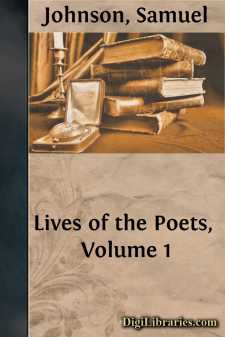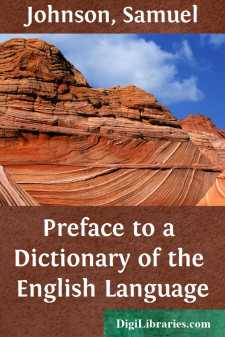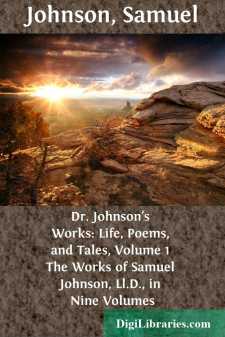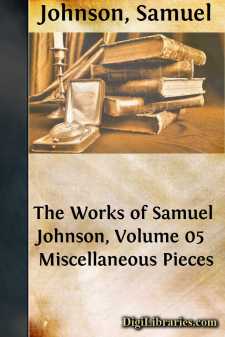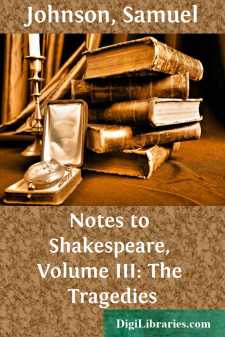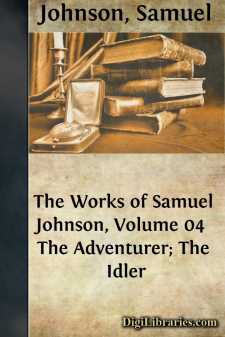Categories
- Antiques & Collectibles 13
- Architecture 36
- Art 48
- Bibles 22
- Biography & Autobiography 813
- Body, Mind & Spirit 142
- Business & Economics 28
- Children's Books 17
- Children's Fiction 14
- Computers 4
- Cooking 94
- Crafts & Hobbies 4
- Drama 346
- Education 46
- Family & Relationships 57
- Fiction 11829
- Games 19
- Gardening 17
- Health & Fitness 34
- History 1377
- House & Home 1
- Humor 147
- Juvenile Fiction 1873
- Juvenile Nonfiction 202
- Language Arts & Disciplines 88
- Law 16
- Literary Collections 686
- Literary Criticism 179
- Mathematics 13
- Medical 41
- Music 40
- Nature 179
- Non-Classifiable 1768
- Performing Arts 7
- Periodicals 1453
- Philosophy 64
- Photography 2
- Poetry 896
- Political Science 203
- Psychology 42
- Reference 154
- Religion 513
- Science 126
- Self-Help 84
- Social Science 81
- Sports & Recreation 34
- Study Aids 3
- Technology & Engineering 59
- Transportation 23
- Travel 463
- True Crime 29
Lives of the Poets, Volume 1
by: Samuel Johnson
Description:
Excerpt
Such was the simple and unpretending advertisement that announced the Lives of the English Poets; a work that gave to the British nation a new style of biography. Johnson's decided taste for this species of writing, and his familiarity with the works of those whose lives he has recorded, peculiarly fitted him for the task; but it has been denounced by some as dogmatical, and even morose; minute critics have detected inaccuracies; the admirers of particular authors have complained of an insufficiency of praise to the objects of their fond and exclusive regard; and the political zealot has affected to decry the staunch and unbending champion of regal and ecclesiastical rights. Those, again, of high and imaginative minds, who "lift themselves up to look to the sky of poetry, and far removed from the dull-making cataract of Nilus, listen to the planet-like music of poetry;" these accuse Johnson of a heavy and insensible soul, because he avowed that nature's "world was brazen, and that the poets only delivered a golden[1]."
But in spite of the censures of political opponents, private friends, and angry critics, it will be acknowledged, by the impartial, and by every lover of virtue and of truth, that Johnson's honest heart, penetrating mind, and powerful intellect, has given to the world memoirs fraught with what is infinitely more valuable than mere verbal criticism, or imaginative speculation; he has presented, in his Lives of the English Poets, the fruits of his long and careful examination of men and manners, and repeated in his age, with the authoritative voice of experience, the same dignified lessons of morality, with which he had instructed his readers in his earlier years. And if these lives contained few merits of their own, they confessedly amended the criticism of the nation, and opened the path to a more enlarged and liberal style of biography than had, before their publication, appeared.
The bold manner in which Johnson delivered what he believed to be the truth, naturally provoked hostile attack, and we are not prepared to say, that, in many instances, the strictures passed upon him might not be just. We will call the attention of our readers to some few of the charges brought against the work now before us, and then leave it to their candid and unbiased judgment to decide, whether the deficiencies pointed out are but as dust in the balance, when brought to weigh against the sterling excellence with which this last and greatest production of our Moralist abounds.
He has been accused of indulging a spirit of political animosity, of an illiberal and captious method of criticism, of frequent inaccuracies, and of a general haughtiness of manner, indicative of a feeling of superiority over the subjects of his memorial.
In the life of Milton his political prejudices are most apparent. It is not our duty, neither our inclination, in this place, to discuss the accuracy of Johnson's political wisdom. We cannot, however, but respect the integrity with which he clung to the instructions of his youth, amidst poverty, and all those inconveniencies which usually drive men to a discontent with things as they are.
Those who censure him without qualification or reserve, are as bad, or worse, on the opposite side.
They accuse him of narrow-minded prejudice, and of bigoted attachment to powers that be with a rancour little befitting the liberality of which they make such vaunting professions. Johnson had a really benevolent heart, but despised and detested the affectation of a sentimental and universal philanthropy, which neglects the practical charities of home and kindred, in its wild and excursive flights after distant and romantic objects. He was no tyrant, even in theory, but he dreaded, and, therefore, sought to expose, the lurking designs of those who opposed constituted authorities, because they hated subjection; and who, when they gained power themselves, proved the well-grounded nature of the fears entertained respecting their sincerity. Johnson was a firm English character, and his surly expressions were often philanthropy in disguise....


